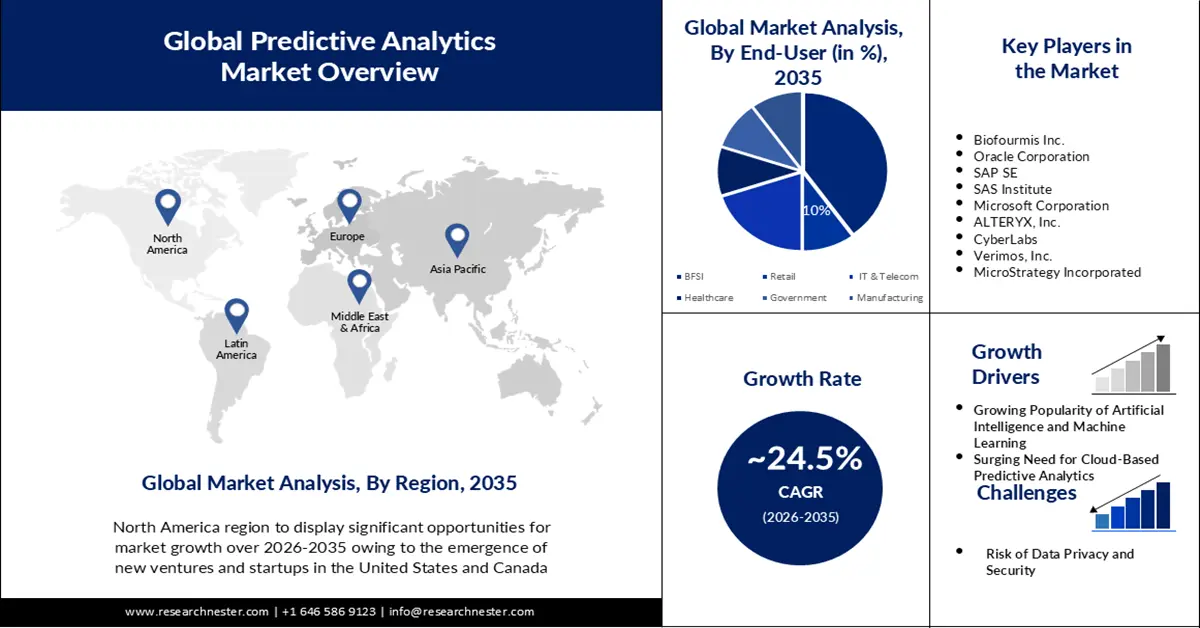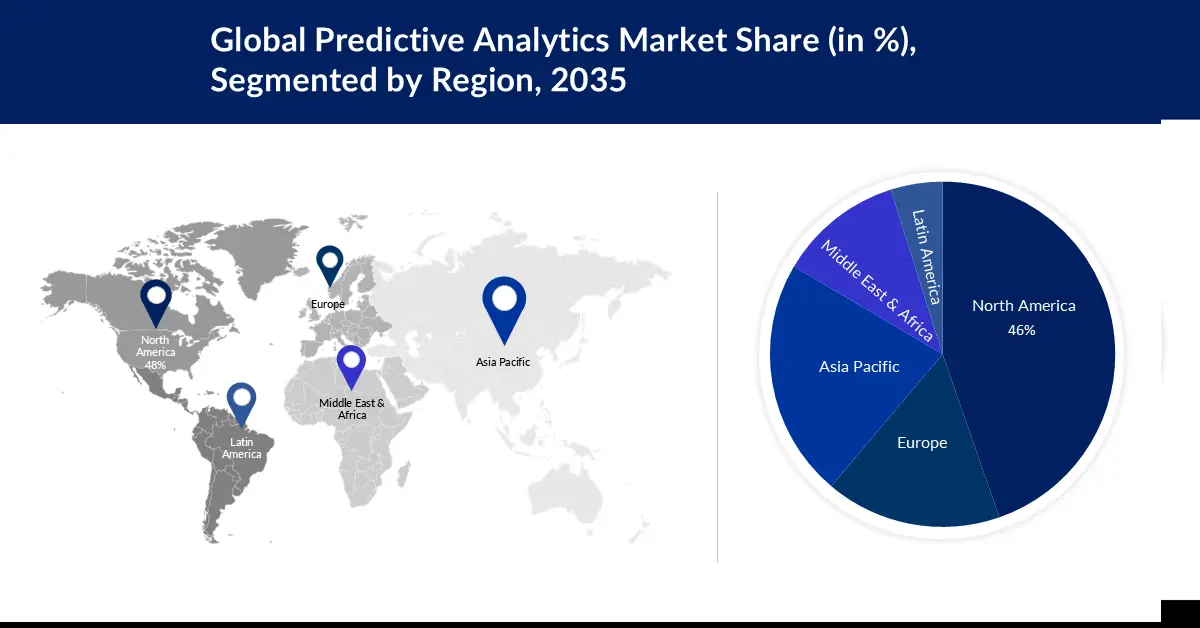Predictive Analytics Market Outlook:
Predictive Analytics Market size was over USD 20.33 billion in 2025 and is projected to reach USD 181.9 billion by 2035, witnessing around 24.5% CAGR during the forecast period i.e., between 2026-2035. In the year 2026, the industry size of predictive analytics is evaluated at USD 24.81 billion.

The market is rising as a result of the increasing demand for data generation across the globe, as the volume of data that is being created daily is astounding and is driven by the proliferation of data-generating devices, such as wearable electronics and smartphones, the widespread use of cloud computing, and the Internet of Things. According to a report, it is anticipated that the amount of data created globally will surpass over 170 zettabytes in 2025, after five more years of growth.
Additionally, the growing number of mergers and acquisitions is believed to fuel predictive analytics market growth. For instance, in March 2023, Accenture acquired Flutura to help customers reach their net zero targets more quickly while also improving the efficiency of factories, refineries, and supply chains and offering Flutura's functionalities to customers in the mining, chemicals, energy, metals, and pharmaceutical sectors by strengthening its AI offerings.
Key Predictive Analytics Market Insights Summary:
Regional Highlights:
- North America predictive analytics market will dominate over 46% share by 2035, attributed to the surge in startups and availability of diverse funding sources.
- Asia Pacific market will capture significant revenue share by 2035, driven by the growing popularity of data analytics and increased internet usage.
Segment Insights:
- The bfsi segment in the predictive analytics market is set for substantial growth during 2026-2035, driven by the surge in digital payments and the use of predictive analytics for fraud detection and personalized services.
Key Growth Trends:
- Growing popularity of AI and machine learning
- High demand for cloud-based predictive analytics
Major Challenges:
- Risk of data privacy and security
- Exorbitant implementation costs include software pricing, hardware and hosting requirements, and engineering costs.
Key Players: IBM Corporation, Biofourmis Inc., Oracle Corporation, SAP SE, SAS Institute, Microsoft Corporation, ALTERYX, Inc., CyberLabs, Verimos, Inc., MicroStrategy Incorporated.
Global Predictive Analytics Market Forecast and Regional Outlook:
Market Size & Growth Projections:
- 2025 Market Size: USD 20.33 billion
- 2026 Market Size: USD 24.81 billion
- Projected Market Size: USD 181.9 billion by 2035
- Growth Forecasts: 24.5% CAGR (2026-2035)
Key Regional Dynamics:
- Largest Region: North America (46% Share by 2035)
- Fastest Growing Region: Asia Pacific
- Dominating Countries: United States, China, United Kingdom, Germany, India
- Emerging Countries: China, India, Japan, South Korea, Brazil
Last updated on : 9 September, 2025
Predictive Analytics Market Growth Drivers and Challenges:
Growth Drivers
- Growing popularity of AI and machine learning - The field of predictive analytics involves the application of machine learning and artificial intelligence, to forecast future events based on both recent and historical data.
In addition, predictive analytics using machine learning can assist sellers in creating products that will draw in new business and keep their current clientele, as well as aid in the identification of fraudulent activity in the financial industry. According to a report, more than 77% of businesses are exploring and using AI. - High demand for cloud-based predictive analytics - The most recent AI innovation that is poised to improve digital experiences with advanced analytics capabilities is cloud-based predictive analytics, which involves analyzing data sets to make predictions about upcoming events and outcomes using predictive models and algorithms.
Organizations may learn more about how well their cloud infrastructure, apps, and services are doing by utilizing the cloud's capabilities and can develop a better understanding of their surroundings. Furthermore, by merging systems and processing power in the cloud, cloud-based predictive analytics also addresses the problem of divergent data sets. - Increase in data-driven decision-making - Predictive analytics is a cutting-edge method to generate insightful insights for better decision-making in the future and is expected to become increasingly crucial in forming strategies, streamlining operations, and gaining a competitive edge as businesses continue to embrace data-driven decision-making.
- Surge in internet accessibility across the globe - Many people use the Internet often all over the world, owing to its increasing impact on individual consumers and the presence of major economies. According to estimates, there were more than 5 billion internet users globally in 2023.
- Rise of predictive analytics in insurance - Predictive analytics is transforming the insurance sector by helping businesses solve challenges, forecast the possibility of property damage and loss, allow insurance companies to enhance customer satisfaction while cutting down on the time and expense associated with processing claims, and get rid of scams.
Challenges
- Risk of data privacy and security - One of the main things that are expected to hinder the market's growth is the possibility of data theft, as predictive analytics works with vast amounts of sensitive data that are attractive to hackers, which increases the possibility of personal data being exploited.
Moreover, predictive analytics can make it possible to gather, analyze, and use a lot of personal data that often represents a danger to privacy rights. - Exorbitant implementation costs include software pricing, hardware and hosting requirements, and engineering costs.
- The usage of inaccurate, erroneous, and inconsistent data may result in flawed predictions.
Predictive Analytics Market Size and Forecast:
| Report Attribute | Details |
|---|---|
|
Base Year |
2025 |
|
Forecast Period |
2026-2035 |
|
CAGR |
24.5% |
|
Base Year Market Size (2025) |
USD 20.33 billion |
|
Forecast Year Market Size (2035) |
USD 181.9 billion |
|
Regional Scope |
|
Predictive Analytics Market Segmentation:
End-User Segment Analysis
The BFSI segment in the predictive analytics market is estimated to gain a share of about 41% in 2035, due to the surge in the adoption of digital payments. In recent times, digital payments have gained significant importance across the globe owing to the swift growth of e-banking and payment systems, as well as the proliferation of digital wallets and mobile payments.
Moreover, AI can evaluate transaction data and offer clients personalized services by utilizing predictive analytics, and banks use it to assess prospective borrowers' creditworthiness.
Additionally, as predictive analytics becomes more widespread, it may aid the BFSI industry in several ways, including fraud detection, targeted marketing, and collections management, amongst others. Banks use predictive analytics to identify potential frauds and take necessary action to stop them from happening by analyzing transaction patterns and client behavior.
Besides this, predictive analytics can be used by banks to find potential new business possibilities and make better choices regarding credit and investment products. Therefore, the use of predictive analytics in BFSI is set to rise in the energy sector.
Solution Segment Analysis
The consumer analytics segment in the predictive analytics market is set to garner a notable share. The market expansion is led by the substantial growth in demand for consumers to produce vast amounts of data from many sources, including social media platforms, e-commerce websites, and many more.
Predictive analytics is the key to the consumer experience of the future since it helps in analyzing customers' past behavior and projecting their future behavior by making use of statistical algorithms, machine learning, and historical data.
Moreover, predictive analytics helps businesses meet customer demand without overstocking warehouses by using previously obtained data and trends to forecast customers' wants, desires, and potential difficulties. Additionally, the surge in demand for data processing solutions and technology is also projected to impact segment growth.
Our in-depth analysis of the global predictive analytics market includes the following segments:
|
End-user |
|
|
Solution |
|
|
Enterprise Size |
|
|
Services |
|
|
Deployment Type |
|

Vishnu Nair
Head - Global Business DevelopmentCustomize this report to your requirements — connect with our consultant for personalized insights and options.
Predictive Analytics Market Regional Analysis:
North American Market Insight
North American region is estimated to account for around 46% predictive analytics market share by 2035. The landscape growth is expected to grow on account of the surge in the emergence of new ventures and startups in the United States and Canada. As more people are investing in startups and other initiatives since the region has access to finance from a variety of sources, including angel investors, venture capitalists, and crowd funding platforms.
Furthermore, as a result, there is a rising need for predictive analytics in the field so that a company can better prepare for the changing tides, plan for demand fluctuations, and forecast future results using data from the past. For instance, more than 330000 new firms were established in the US in the second quarter of 2023.
Moreover, there has been a surge in smartphone usage, along with the generation of data in corporate enterprises, which is further driving industrial growth and boosting the market revenue share.
APAC Market Insight
Asia Pacific region is estimated to account for significant predictive analytics market share by 2035, accounting for the second position attributed to the growing popularity of data analytics.
In the past few years, data analytics in India has grown owing to an exponential increase in internet users. Impelled by this, the importance of data-driven decision-making has grown in the area, which has expanded the use of predictive analytics to help organizations make informed choices. For instance, the banking sector in India spent more than 18% of its total budget on big data and analytics in 2021.

Predictive Analytics Market Players:
- IBM Corporation
- Company Overview
- Business Strategy
- Key Product Offerings
- Financial Performance
- Key Performance Indicators
- Risk Analysis
- Recent Development
- Regional Presence
- SWOT Analysis
- Biofourmis Inc.
- Oracle Corporation
- SAP SE
- SAS Institute
- Microsoft Corporation
- ALTERYX, Inc.
- CyberLabs
- Verimos, Inc.
- MicroStrategy Incorporated
Recent Developments
- ALTERYX, Inc.- acquired Trifacta to identify new possibilities to target new data and cloud transformation efforts that serve the needs of the whole organization, from data analytics teams and IT/technology teams to line-of-business users.
- IBM Corporation- introduced new software IBM Business Analytics Enterprise to give companies the instruments they need to support data-driven decision-making by removing data and analytics silos and enabling clients to execute analytics anywhere.
- Report ID: 3926
- Published Date: Sep 09, 2025
- Report Format: PDF, PPT
- Explore a preview of key market trends and insights
- Review sample data tables and segment breakdowns
- Experience the quality of our visual data representations
- Evaluate our report structure and research methodology
- Get a glimpse of competitive landscape analysis
- Understand how regional forecasts are presented
- Assess the depth of company profiling and benchmarking
- Preview how actionable insights can support your strategy
Explore real data and analysis
Frequently Asked Questions (FAQ)
Predictive Analytics Market Report Scope
Free Sample includes current and historical market size, growth trends, regional charts & tables, company profiles, segment-wise forecasts, and more.
Connect with our Expert
Copyright @ 2026 Research Nester. All Rights Reserved.




